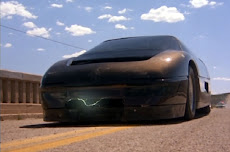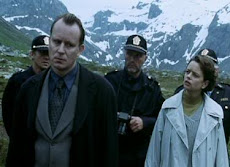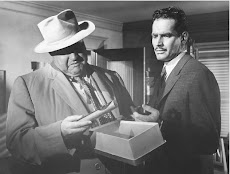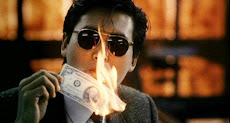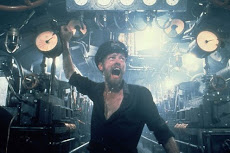With this, Zack Snyder can, perhaps, join our directorial hat-trick list, slotting in this #3 on the heels of 300 (2006) and Dawn of the Dead (2004). This is a very respectable list, especially notable because all three films originate from well-regarded source material. Dawn of the Dead is a remake of George Romero's 1978 follow-up to his own classic Night of the Living Dead (1968) (catch all that?). Considering Romero's own protege Tom Savini couldn't successfully remake Night (1990), to pull off Dawn as well as Snyder did (on top of it being Snyder's first feature film) was almost miraculous. While Sin City (2005) was well done and certainly star-studded, it hasn't enjoyed the staying power of 300, Snyder's first foray into not just comic books, but comic books from one of the masters, Frank Miller.
 After reading the Watchmen graphic novel (read: a 12 comic book series bound into one volume) for the first time just last June, when the trailer for the film dropped with The Dark Knight over the summer I was enthused, but anxious. Watchmen is the most influential comic book ever created. (I highly recommend The Dark Knight Returns and the first 12 issues of American Flagg! as well, but I digress.) Its narrative, complexity and delightful tangents are, taken as a whole, nothing short of intimidating (but in a good way). Snyder is a gifted director, but when directors none other than Terry Gilliam (no slouch when it comes to difficult adaptations) have judged a work "unfilmable," it's no insult to suspect he may have bit off more than he could chew.
After reading the Watchmen graphic novel (read: a 12 comic book series bound into one volume) for the first time just last June, when the trailer for the film dropped with The Dark Knight over the summer I was enthused, but anxious. Watchmen is the most influential comic book ever created. (I highly recommend The Dark Knight Returns and the first 12 issues of American Flagg! as well, but I digress.) Its narrative, complexity and delightful tangents are, taken as a whole, nothing short of intimidating (but in a good way). Snyder is a gifted director, but when directors none other than Terry Gilliam (no slouch when it comes to difficult adaptations) have judged a work "unfilmable," it's no insult to suspect he may have bit off more than he could chew.Thankfully, my fears did not come true. Entirely.
As a director, once again Snyder has proved his worth. He has taken a classic and translated it seamlessly to the big screen. I will not be slobbering all over this film; I do have reservations, but it is a noble cinematic effort which I believe deserves far more praise than popcorn fare like The Dark Knight.
At 163 minutes this is a long film, but it only misses its pace on a few occasions. Having seen the film after reading the novel, I knew what was coming and looked forward to it, and was most often impressed with the execution. If only for purposes of time, rewrites, and subtractions and additions to dialogue were necessary, and mostly well-done. Joe Morgenstern's review in the Wall Street Journal rightfully blasts some lines such as "I'm not a comic-book villain," but I daresay he's nitpicking. The action is intense, however quite graphic (another trademark for all three of Snyder's feature films), but interesting and well-choreographed. I believed for a time after Matrix Reloaded that Hollywood had completely lost it with fight scenes, but with Watchmen and 300 Snyder's ensured they're alive and well. The mis en scene is outstanding, and I have nothing but respect for the costume designers, set designers and other assorted crew who put this together.
The acting varies. Fortunately, Jackie Earle Haley is perfect as Rorschach, arguably the story's main character. Especially when he's unmasked, Haley brings to life a very disturbed man who, while I don't want to be his friend, draws some respect for his uncompromising nature. Billy Crudup is almost as good as Dr. Manhattan, but in his more sensitive moments I couldn't help but think of Tobey Maguire as Peter Parker, Spider-Man's civilian side. Patrick Wilson is good as Nite Owl, but he shares many scenes with Malin Akerman who, I'm sorry to say, has a ways to go.
Snyder's, and the film's, boldest trademark is Snyder's fearless use of popular music. This should be no surprise: for the opening credits of Dawn of the Dead he selected "The Man Comes Around" by Johnny Cash, and it's amazing. In Watchmen, we're treated to Simon & Garfunkel, Jimmi Hendrix, Bob Dylan, etc., and all to great effect.
I cap the good aspects of this film with the music because it's one of the few things that truly separates Watchmen from its source material. Floating at a meager score of 56/100 on metacritic at the time of this post, this is the quandary many critics, myself included, face with the film: why? Is there a point where a translation is done so effectively that it becomes meaningless or even insulting? Of course, there's no satisfying the entire audience: too much creative license would have drawn equally (if not more) powerful wrath from those crying "sacrilege!" But this only dodges the question.
To be sure, Watchmen is treading into charted but not-as-of-yet mastered territory: parallel media. The comic is so dense with material, nothing short of a 13-hour mini-series would have brought it all to the screen. So, soon enough we'll have an animated version of Tales of the Black Freighter to supplement the film. Tales is an excellent parallel narrative in the comic. This kind of multi-pronged storytelling hasn't worked out well thus far: Star Wars: The Clone Wars opened in theaters last year to launch a television series without much success. Far less successfully, though, Richard Kelly's disaster Southland Tales is actually the last three chapters in a six-chapter story, the first three chapters being comic books very few people purchased (guilty). But where these films were producing fresh material in various forms, Watchmen seeks to preserve an old story in a new form. David Edelstein may be right: "This kind of reverence kills what it seeks to preserve."
This nagging feeling combines with my biggest critique of Watchmen as a film and as a graphic novel. For all of the criticism that may be directed toward the film, it strikes me that the heavy-handedness, the "there is no hope" message of Watchmen is rather over-the-top. To be sure, Rorschach (and, perhaps, all his "reactionary" faults?) has the last laugh, but this seems to pale in light of the story's climax. Both Tales of the Black Freighter and the main narrative in Watchmen give off disturbing support of... well, inaction? We have two stories which show that the pursuance of good, or the best intentions, can be corrupted with evil means. This is a tragedy as old as man, but the film and the novel alike seem to sigh at this with an all-encompassing "oh, well." Whether one fights evil means uncompromisingly as Rorschach does or pursues good ends with those evil means as Ozymandias, it seems that "All's Well that Ends Well." Sure, there's a glimmer of humor and hope in the closing of the story, but is this a little too little too late?
Unlike No Country for Old Men, a film and book with dastardliness I defend as a call to arms, Watchmen ultimately strikes me with a call to do nothing: if greater forces are at work, there's no stopping them. I won't settle for this.
In conclusion, I suppose I've learned in this post why I'd never make for a good movie reviewer on the clock: I need time to digest this stuff. Often, lots of it. Blade Runner, that film I gave a whole post to a few weeks back? I hated it the first time I saw it. Perhaps someday I'll have some conclusions for all the questions I've raised with Watchmen. But, indeed, while I have plenty of criticism to level at it, Watchmen is a very thought-provoking and expertly executed film that I encourage moviegoers to see.
I'll end almost as I began: this isn't The Dark Knight, and I mean that as a compliment.


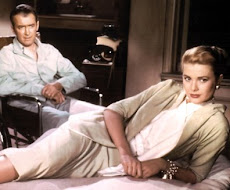_01.jpg)





